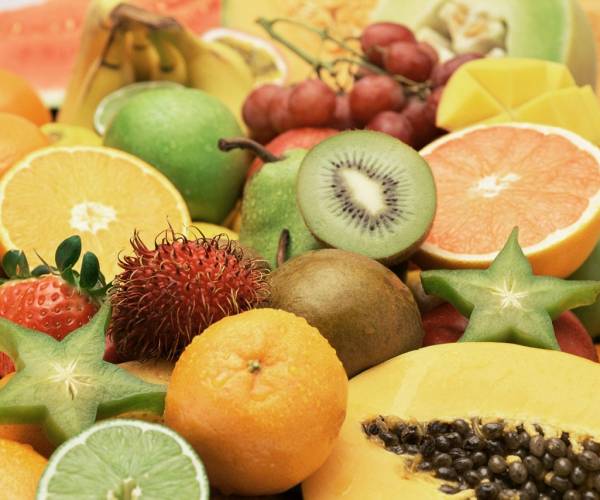Our diet is a major contributor to our health.
What we eat is like the fuel the body needs to function effectively. With our diet we build our immune system by our body extracting the necessary nutrients, minerals, vitamins and trace elements from food and making them available to cells.
At this moment, each enzyme, each unit, takes over its task in the body and ensures that everything can work well. If nutrients are lacking, important bodily functions are missing or weakened and the person can fall ill.
In today’s world, due to the use of pesticides as well as soil leaching from monoculture in the fields, the nutrients in our diet are lower than they were 20 years ago. Also, the industrial processing of crops in addition to various questionable synthetic additives, increases the decrease of nutrients in our food. However, there is not only a lack of nutrients alone, but also a lack of functions in the body and in the soil of the fields to be able to form the nutrients at all and make them available.
Our food can only ever be as good as the soil from which it grows. So, in the meantime, it is also the microbial world that has fallen into a state of imbalance.
There is a lack of microorganisms for healthy soil and microorganisms in the human body that make nutrients available to cells.
The two must go hand in hand and a disbalance in one of these points will result in a disbalance in the other mileu. It is therefore important to establish a bacterial balance in nature, in the air, as well as in the human body and environment, and to contribute to maintaining this balance in its diversity.
What can be the consequences of an imbalance of bacterial flora in the body?
We will probably fall ill sooner or later.
The following diseases and complaints can be triggered by a disbalance of the bacterial flora in the body:
- Gastrointestinal complaints of all kinds (constipation, diarrhea, stomach pain, flatulence, bloating, intolerances, etc.)
- Allergies
- Headache
- Migraine
- Negative thoughts, depression
- Tiredness, fatigue
- Listlessness
- Loss of appetite
- Overweight
- Underweight
- Skin problems (rashes, itching, dermatitis, neurodermatitis, allergies, etc.)
- Respiratory
Etc.
The complaints most commonly associated with microbial imbalance are those affecting the digestive system. Because here the outside world comes into contact with our inside and is to be utilized. If the organisms for utilization are disturbed, deficiency symptoms occur in the body and the signals sometimes even pass on to other organs. Balancing our overall microbiome, inside and out, is instrumental in maintaining a healthy immune system. So it is of great importance to keep this healthy. Beyond this, we should also attach importance to maintaining a balanced bacterial environment in our environment, in the fields and in the wild.
What can I personally do to contribute to the balance of bacterial diversity in the world?
- Support biodynamic agriculture!
- Pay attention to what you feed your body!
- Eat balanced!
- Preferably buy seasonal and regional ingredients!
- If possible, do not clean your environment with bacteria-killing agents!
- If you have to clean bacterially on medical advice (e.g. use of antibiotics, obligation to boil wash in the case of bacterial diseases), actively coat the area with regenerative microbes immediately afterwards in order to avoid leaving a “bacterial vacuum"!
- Prepare your food as fresh as possible and microbially infect your food with ferment seasoning after cooking!
- Buy little industrially processed food!
- Create a small vegetable and or herb patch at home if possible!
- Plant fruit trees and fruit bushes in the garden if possible!
- Enrich your environment with MikroVeda microorganisms! What are MikroVeda Microorganisms?
- Support your microbiome through natural supplements with MikroVeda microorganisms!
Since the bacterial imbalance can therefore not only affect our body and deserves a holistic approach, it is appropriate to enrich the soil, indeed our entire environment – our nature – with microorganisms to be able to restore a natural balance.
Did you know that with a healthy microbiome, you can also contribute to the remediation of a wastewater environment through excretions?
Organic as a solution to the bacteria problem?
The problem of lack of bacterial diversity is far reaching and the solution is not simply done with “organic". This is because the simple organic standards do not take into account the bacterial life in the soil and air. Only a few organic associations rely on the use of coordinated, communalized microorganisms for the arable soils and on a healthy and natural cycle of nature. This means taking a close look at what guidelines the association stands for and to what extent this can be guaranteed.
Fermented foods as a supplement for a healthy diet?
Unfortunately, today we often resort to industrial products, which we then process in our kitchen. So we buy juices, pre-cooked pasta, beet, pestos etc. to prepare a tasty healthy meal. Unfortunately, even the organic products, which we already prefer to conventional products with our conscious and critical eye, are just as industrially processed. The ingredients can certainly be purer, but they are also heated or sterilized under pressure. These processes of preservation kill – as intended – almost all bacteria and allow the products to become merchantable. We appreciate this because it essentially makes our lives easier.
During sterilization, important nutrients and regenerative microorganisms are lost, which our body so urgently needs. Unfortunately, however, even food supplements are often sterilized or bacterial diversity is suggested, although exclusively based on thawed – previously frozen – cultures and thus the activity of the microbes but also the general stability of this diversity can be very questionable on average.
Just 50 years ago, people did not enjoy the abundance of industrial products and had to preserve their harvest from the garden themselves in order to be able to enjoy it even in the winter months. The knowledge of fermentation was ubiquitous, appreciated and loved by people for thousands of years. And it is not because fermenting no longer offers benefits that it has fallen into oblivion today, but rather because the need has been taken away from us by the industry. Today, we no longer need to do our own canning and pickling, as this is now done for us by the manufacturers.
We have forgotten the importance of fermented foods for our health. Because the benefit for us in the winter was not only the availability of food, but also the active ingredients, which were created by fermentation in the first place. Thus, fermented foods helped digestion and strengthened our immune system.
Why? Because the microorganisms, which by fermenting at a temperature of no more than 37 degrees Celsius really start their work and are particularly effective in the existing environment: Enzymes, antioxidants and bioactive substances are produced, which are particularly important for our health. The food becomes more digestible and also acquires a whole new, special taste. We no longer get this quality in the form and concentration we do in today’s industrially preserved foods.
So again we should acquire knowledge about fermenting, because especially today we should pay attention not only to what food we eat, but also what is in this food for us.
Help your body absorb nutrients!
How you can ferment yourself at home…
Which microorganism preparations are suitable for dietary supplementation?
Over the past 30 years, pioneers in the field of microorganism research have succeeded in bringing together microorganisms that can work particularly well together. To date, MikroVeda has been a leading pioneer in developing preparations based on natural ingredients that, fermented with the addition of microorganisms, can achieve remarkable effects. To this day, these preparations have been perfected and are used in a variety of ways to create healthy bacterial environments. They are GMO-free and of natural origin. The bacterial composition consists, among others, of lactic acid bacteria, photosynthetic bacteria and yeasts that occur freely in nature.
For internal health and building a healthy internal microbiome, specially formulated supplements are suitable as a fermentation drink. When it comes to the ingredients of the microorganism preparations, you should always go for organic quality to ensure a basic assurance of the purity of the raw materials. Here, too, however, the seals differ in quality among themselves.
MikroVeda is certified organic and you can be sure of the organic quality of the ingredients. Also, MikroVeda pays great attention to the composition of ingredients and follows a coordinated recipe for fermentation. MicroVeda microorganisms can survive stomach acid and arrive alive in the intestine to work successfully. It is the composition of MikroVeda microorganisms that makes the quality and effectiveness. They can help strengthen the microbiome from within, contributing to a healthy digestive system. The bacterial environment is healthy, the diversity balanced and stable, so that the functions in the body, such as the breakdown for cellular availability of nutrients, can function better. MikroVeda, as a manufacturer of microorganism preparations, masters the greatest variety of regenerative bacterial strains, which are then also incorporated into colonies at the same time, providing a stable product in composition. This is also reflected in the high quality of MikroVeda products and directly benefits our customers, for example, in food and nutritional supplements.
Some of the MikroVeda preparations are gently fermented with plant and herbal extracts. These are adapted to the digestive activity in the human body. For those who have intolerances to these ingredients, MikroVeda offers a preparation that has been fermented pure, without herbal or plant extracts.
Why is fermented?
The selected microbial strains are first brought together and then fermented using a specific technology from weeks to years depending on the product. Different types of sugars can serve as bacterial feed, but these in turn can lead to different fermentation results. In principle, sugar cane molasses is suitable for this purpose due to the so-called C4 sugars. Through fermentation, the liquid gently matures and is pre-digested by the microorganisms, so to speak, making the valuable ingredients of the ingredients cell-available.
The result is complex in nature and highly concentrated. Probiotic-ferment-active microorganisms preserve vitamins during fermentation, increasing, for example, the content of free amino acids, palmitic and short-chain fatty acids and vitamin C, while sugar is broken down. The duration of fermentation, the production technique used (which may involve several stages), the microorganisms used in each case and the composition of the ingredients make up the complexity and high quality of the end product. They are marketed as ferment drinks or probiotics by manufacturers.
Unfortunately, sometimes bacterial diversity is suggested in products with probiotic strains, although in fact the manufacturer only works with individual biocultures or exclusively on a lactic acid basis. However, for microorganisms to provide better regenerative support, a stable diversity of biocultures in fermentation products is essential. Sometimes, even in the manufacturing process, cultures are ultimately partially or completely destroyed by sterilization, substantially reducing the effectiveness that probiotic strains in particular are supposed to contain for us – be it probiotic starter cultures for fermentation at home, probiotics as dietary supplements, but also typically bacterial remedies for cleaning, maintaining or sanitizing a milieu.
How can I recognize a good microorganism preparation as a food supplement?
On the product label you will find information about ingredients, number of bacteria strains (not number of bacteria!), colony density, other ingredients as well as certifications of the respective manufacturer. In addition, regardless of this information, experience in the particular technique used is important for the probiotic product’s likely effectiveness. Does the manufacturer work with active, living cultures? For example, it can also be stated that the use of lactic acid bacteria can already be supportive for digestion, but the diversity of strains always remains limited and pure lactic acid fermentations are not to be counted among the range of action of MikroVeda microorganisms.
Therefore, consciously check the regenerative variety of microorganisms offered. At the same time, pay attention to the seriousness of the marketing and any promises. Ultimately, the purchase of probiotic preparations of all kinds always remains a leap of faith towards the respective manufacturer.
So, first of all, decide which preparation you want to choose according to these characteristics and then try its effectiveness. Already after a few weeks the success should be noticeable. Which preparation is best for you in terms of its effect in everyday use will also be the right one for you. It is the recipe, the effective combination of living microorganisms and the environment in conjunction with the fermentation technique used, the manufacturing process and the matching of ingredients that produce the desired effect.
“Not all probiotics are created equal. This is especially true for the area of Effective Microorganisms, be it in the know-how in handling multi-cultures, the selection of raw materials, fine-tuning of formulations, the gentle fermentation process, but also long-term stability of the preparations, especially with regard to the high number of different multi-biocultures. The fermentation techniques applied to MikroVeda products vary – depending on the mileu the product is targeting – from a few weeks to multi-year, multi-stage fermentation and filtration processes. In the process, our production is subject to strict quality management and exemplary certification processes, and is coordinated with relevant international research partners."
Kurt Walter Lau, Managing Director, pioneer and founder of MikroVeda
The use of live microorganisms as a food supplement is always done within the framework of one’s own responsibility in favor of a healthy diet. However, they do not replace any medication or therapies that may be necessary, should be used in principle supportive also with a healthy, balanced diet.





